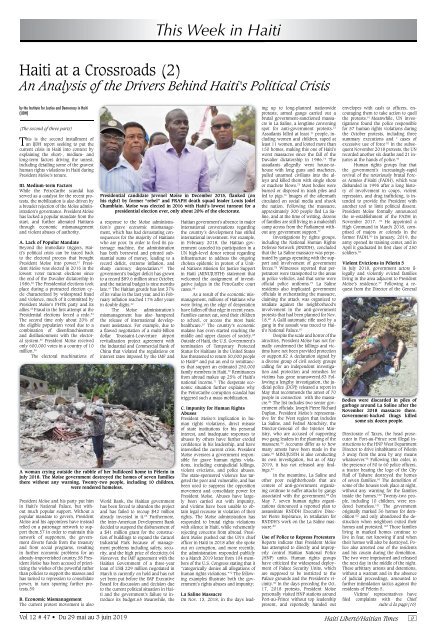You also want an ePaper? Increase the reach of your titles
YUMPU automatically turns print PDFs into web optimized ePapers that Google loves.
This Week in <strong>Haiti</strong><br />
<strong>Haiti</strong> at a Crossroads (2)<br />
An Analysis of the Drivers Behind <strong>Haiti</strong>'s Political Crisis<br />
by the Institute for Justice and Democracy in <strong>Haiti</strong><br />
(IJDH)<br />
(The second of three parts)<br />
This is the second installment of<br />
an IJDH report seeking to put the<br />
current crisis in <strong>Haiti</strong> into context by<br />
explaining the short-, medium- and<br />
long-term factors driving the unrest,<br />
including detailing some of the gravest<br />
human rights violations in <strong>Haiti</strong> during<br />
President Moïse’s tenure.<br />
III. Medium-term Factors<br />
While the PetroCaribe scandal has<br />
served as a catalyst for the recent protests,<br />
the mobilization is also driven by<br />
a broader rejection of the Moïse administration’s<br />
governance. President Moïse<br />
has lacked a popular mandate from the<br />
start, and further alienated <strong>Haiti</strong>ans<br />
through economic mismanagement<br />
and violent abuses of authority.<br />
A. Lack of Popular Mandate<br />
Beyond the immediate triggers, <strong>Haiti</strong>’s<br />
political crisis can be traced back<br />
to the electoral process that brought<br />
President Moïse into power. 51 President<br />
Moïse was elected in 2016 in the<br />
lowest voter turnout elections since<br />
the end of the Duvalier dictatorship in<br />
1986. 52 The Presidential elections took<br />
place during a protracted election cycle<br />
characterized by widespread fraud<br />
and violence, much of it committed by<br />
President Moïse’s PHTK party and its<br />
allies. 53 Fraud in the first attempt at the<br />
Presidential elections forced a redo. 54<br />
The second time only about 20% of<br />
the eligible population voted due to a<br />
combination of disenfranchisement<br />
and disillusionment with the electoral<br />
system. 55 President Moïse received<br />
only 600,000 votes in a country of 10<br />
million. 56<br />
The electoral machinations of<br />
President Moïse and his party put him<br />
in <strong>Haiti</strong>’s National Palace, but without<br />
much popular support. Without a<br />
popular mandate to govern, President<br />
Moïse and his appointees have instead<br />
relied on a patronage network to support<br />
them.57 In order to maintain this<br />
network of supporters, the government<br />
diverts funds from the treasury<br />
and from social programs, resulting<br />
in further economic problems for an<br />
already-impoverished country.58 President<br />
Moïse has been accused of prioritizing<br />
the wishes of the powerful rather<br />
than policies to support the masses and<br />
has turned to repression to consolidate<br />
power, in turn spurring further protests.59<br />
B. Economic Mismanagement<br />
The current protest movement is also<br />
a response to the Moïse administration’s<br />
grave economic mismanagement,<br />
which has had devastating consequences<br />
for the majority of <strong>Haiti</strong>ans<br />
who are poor. In order to feed its patronage<br />
machine, the administration<br />
has both borrowed and printed substantial<br />
sums of money, leading to a<br />
record deficit, extreme inflation, and<br />
sharp currency depreciation. 60 The<br />
government’s budget deficit has grown<br />
to a record $89.6 million since October,<br />
and the national budget is nine months<br />
late. 61 The <strong>Haiti</strong>an gourde has lost 37%<br />
of its value in the last year, and in February<br />
inflation reached 17% after years<br />
in double digits. 62<br />
The Moïse administration’s<br />
mismanagement has also hampered<br />
the release of international development<br />
assistance. For example, due to<br />
a flawed negotiation of a multi-billion<br />
dollar Toussaint-Louverture airport<br />
revitalization project agreement with<br />
the Industrial and Commercial Bank of<br />
China that violated the regulations on<br />
interest rates imposed by the IMF and<br />
A woman crying outside the rubble of her bulldozed home in Pèlerin in<br />
July 2018. The Moïse government destroyed the homes of seven families<br />
there without any warning. Twenty-two people, including 10 children,<br />
were rendered homeless.<br />
Presidential candidate Jovenel Moïse in December 2015, flanked (on<br />
his right) by former “rebel” and FRAPH death squad leader Louis Jodel<br />
Chamblain. Moïse was elected in 2016 with <strong>Haiti</strong>’s lowest turnout for a<br />
presidential election ever, only about 20% of the electorate.<br />
Le Nouvelliste<br />
World Bank, the <strong>Haiti</strong>an government<br />
has been forced to abandon the project<br />
and has failed to recoup $42 million<br />
already invested in it. 63 Furthermore,<br />
the Inter-American Development Bank<br />
decided to suspend the disbursement of<br />
a $41 million grant for the construction<br />
of buildings to expand the Caracol<br />
Industrial Park because of management<br />
problems including safety, security,<br />
and the high price of electricity.64<br />
Moreover, the IMF agreement with the<br />
<strong>Haiti</strong>an Government of a three-year<br />
loan of US$ 2<strong>29</strong> million negotiated in<br />
March is currently on hold and has not<br />
yet been put before the IMF Executive<br />
Board for discussion and decision due<br />
to the current political situation in <strong>Haiti</strong><br />
and the government’s failure to introduce<br />
its budget.65 Meanwhile, the<br />
<strong>Haiti</strong>an government’s absence in major<br />
international conversations regarding<br />
the country’s development has stifled<br />
international investment. For example,<br />
in February 2018, the <strong>Haiti</strong>an government<br />
canceled its participation in a<br />
UN high-level donor retreat regarding<br />
infrastructure to address the ongoing<br />
cholera epidemic in protest of a United<br />
Nations Mission for Justice Support<br />
in <strong>Haiti</strong> (MINUJUSTH) statement that<br />
welcomed the assignment of investigative<br />
judges in the PetroCaribe court<br />
cases. 66 As a result of the economic mismanagement,<br />
millions of <strong>Haiti</strong>ans who<br />
were living on the edge of desperation<br />
have fallen off that edge in recent years.<br />
Families cannot eat, send their children<br />
to school, or access the most basic<br />
healthcare. 67 The country’s economic<br />
malaise has even started reaching the<br />
middle and upper classes of society. 68<br />
Outside of <strong>Haiti</strong>, the U.S. Government’s<br />
termination of Temporary Protected<br />
Status for <strong>Haiti</strong>ans in the United States<br />
has threatened to return 50,000 people<br />
to <strong>Haiti</strong> 69 and put an end to remittances<br />
that support an estimated 250,000<br />
family members in <strong>Haiti</strong>. 70 Remittances<br />
from abroad makes up 25% of <strong>Haiti</strong>’s<br />
national income. 71 The desperate economic<br />
situation further explains why<br />
the PetroCaribe corruption scandal has<br />
triggered such a mass mobilization.<br />
C. Impunity for Human Rights<br />
Abuses<br />
President Moïse’s implication in human<br />
rights violations, direct misuse<br />
of state institutions for his personal<br />
interest, and inadequate responses to<br />
abuses by others have further eroded<br />
confidence in his leadership, and have<br />
intensified the current crisis. President<br />
Moïse oversees a government responsible<br />
for grave human rights violations,<br />
including extrajudicial killings,<br />
violent evictions, and police abuses.<br />
The state-sponsored violence has targeted<br />
the poor and vulnerable, and has<br />
been used to suppress the opposition<br />
movement and consolidate power for<br />
President Moïse. Abuses have largely<br />
been carried out with impunity,<br />
and victims have been unable to obtain<br />
legal recourse in violation of their<br />
rights. The Moïse administration has<br />
responded to brutal rights violations<br />
with silence in <strong>Haiti</strong>, while vehemently<br />
rejecting concerns from abroad. President<br />
Moïse pushed out the UN’s chief<br />
officer in <strong>Haiti</strong> in 2018 after she spoke<br />
out on corruption, and more recently,<br />
the administration responded publicly<br />
to a March <strong>2019</strong> letter from 104 members<br />
of the U.S. Congress stating that it<br />
“categorically denies all allegations of<br />
human rights violations.” 72 The following<br />
examples illustrate both the government’s<br />
rights abuses and impunity:<br />
La Saline Massacre<br />
On Nov. 13, 2018, in the days leading<br />
up to long-planned nationwide<br />
protests, armed gangs carried out a<br />
brutal government-sanctioned massacre<br />
in La Saline, a longtime convening<br />
spot for anti-government protests. 73<br />
Assailants killed at least 71 people, including<br />
women and children, raped at<br />
least 11 women, and looted more than<br />
150 homes, making this one of <strong>Haiti</strong>’s<br />
worst massacres since the fall of the<br />
Duvalier dictatorship in 1986. 74 The<br />
assailants allegedly went house-tohouse<br />
with long guns and machetes,<br />
pulled unarmed civilians into the alleys<br />
and killed them with single shots<br />
or machete blows. 75 Most bodies were<br />
burned or disposed in trash piles and<br />
fed to pigs. 76 Images of the aftermath<br />
circulated on social media and shook<br />
the nation. Following the massacre,<br />
approximately 300 people fled La Saline,<br />
and at the time of writing, dozens<br />
of families are still living in a makeshift<br />
camp across from the Parliament without<br />
any government support. 77<br />
Investigations by rights groups,<br />
including the National Human Rights<br />
Defense Network (RNDDH), concluded<br />
that the La Saline massacre was perpetrated<br />
by gangs operating with the support<br />
and involvement of government<br />
forces. 78 Witnesses reported that perpetrators<br />
were transported to the areas<br />
in police vehicles, and that some wore<br />
official police uniforms. 79 La Saline<br />
residents also implicated government<br />
officials in orchestrating the massacre,<br />
claiming the attack was organized to<br />
retaliate against the neighborhood’s<br />
involvement in the anti-government<br />
protests that had been planned for Nov.<br />
18. 80 A Galil automatic rifle used by a<br />
gang in the assault was traced to <strong>Haiti</strong>’s<br />
National Palace. 81<br />
Despite the scale and horror of the<br />
atrocities, President Moïse has not formally<br />
condemned the killings and victims<br />
have not been provided protection<br />
or support.82 A declaration signed by<br />
a diverse group of civil society groups<br />
calling for an independent investigation<br />
and protection and remedies for<br />
victims has gone unanswered.83 Following<br />
a lengthy investigation, the judicial<br />
police (DCPJ) released a report in<br />
May that recommends the arrest of 70<br />
people in connection with the massacre.<br />
84 The list includes two senior government<br />
officials: Joseph Pierre Richard<br />
Duplan, President Moïse’s representative<br />
for the West region that includes<br />
La Saline, and Fednel Monchéry, the<br />
Director-General of the Interior Ministry,<br />
who are accused of supporting<br />
two gang leaders in the planning of the<br />
massacre. 85 Accounts differ as to how<br />
many arrests have been made in the<br />
case. 86 MINUJUSTH is also conducting<br />
its own investigation, but as of May<br />
<strong>2019</strong>, it has not released any findings.<br />
87<br />
In the meantime, La Saline and<br />
other poor neighborhoods that are<br />
centers of anti-government organizing<br />
continue to suffer attacks by gangs<br />
associated with the government. 88 On<br />
May 7, seven human rights organizations<br />
denounced a reported plan to<br />
assassinate RNDDH Executive Director<br />
Pierre Espérance, in retaliation for<br />
RNDDH’s work on the La Saline massacre.<br />
89<br />
Use of Police to Repress Protesters<br />
Reports indicate that President Moïse<br />
has attempted to directly and improperly<br />
control <strong>Haiti</strong>an National Police<br />
(HNP) units. Human rights groups<br />
have criticized the widespread deployment<br />
of Palace Security Units, which<br />
are supposed to be restricted to the<br />
Palace grounds and the President’s vicinity.<br />
90 In the days preceding the Oct.<br />
17, 2018 protests, President Moïse<br />
personally visited HNP stations around<br />
Port-au-Prince without top leadership<br />
present, and reportedly handed out<br />
envelopes with cash to officers, encouraging<br />
them to take action to quell<br />
the protests. 91 Meanwhile, UN investigations<br />
found the police responsible<br />
for 57 human rights violations during<br />
the October protests, including three<br />
summary executions and z cases of<br />
excessive use of force .92 In the subsequent<br />
November 2018 protests, the UN<br />
recorded another six deaths and 21 injuries<br />
at the hands of police. 93<br />
Human rights groups fear that<br />
the government’s increasingly-rapid<br />
revival of the notoriously brutal Forces<br />
Armées d’Haïti (FADH), which was<br />
disbanded in 1995 after a long history<br />
of involvement in coups, violent<br />
repression, and drug trafficking, is intended<br />
to provide the President with<br />
another tool to limit political dissent.<br />
President Moïse formally announced<br />
the re-establishment of the FADH in<br />
November 2017. 94 He appointed a<br />
High Command in March 2018, comprised<br />
of majors or colonels in the<br />
former FADH. 95 In January, <strong>2019</strong>, the<br />
army opened its training center, and in<br />
April it graduated its first class of 250<br />
soldiers. 96<br />
Violent Evictions in Pèlerin 5<br />
In July 2018, government actors illegally<br />
and violently evicted families<br />
living in the area adjacent to President<br />
Moïse’s residence. 97 Following a request<br />
from the Director of the General<br />
Bodies were discarded in piles of<br />
garbage around La Saline after the<br />
November 2018 massacre there.<br />
Government-backed thugs killed<br />
some six dozen people.<br />
Directorate of Taxes, the head prosecutor<br />
in Port-au-Prince sent illegal instructions<br />
to the HNP West Department<br />
Director to drive inhabitants of Pèlerin<br />
5 away from the area by any means<br />
whatsoever. 98 Following this order, in<br />
the presence of 50 to 60 police officers,<br />
a tractor bearing the logo of the City<br />
Hall of Tabarre destroyed the homes<br />
of seven families. 99 The demolition of<br />
some of the houses took place at night,<br />
without any warning for the families<br />
inside the homes. 100 Twenty-two people,<br />
including 10 children, were rendered<br />
homeless. 101 The government<br />
originally marked 36 homes for demolition<br />
102 and only abandoned the destruction<br />
when neighbors exited their<br />
homes and protested. 103 Those families<br />
living in marked homes continue to<br />
live in fear, not knowing if and when<br />
their homes will also be destroyed. Police<br />
also arrested one of the residents<br />
and his cousin during the demolition.<br />
The two were imprisoned and released<br />
the next day in the middle of the night.<br />
These arbitrary arrests and detentions,<br />
without a warrant and in the absence<br />
of judicial proceedings, amounted to<br />
further intimidation tactics against the<br />
residents of Pèlerin 5.<br />
Victims’ representatives have<br />
filed complaints with the Chief<br />
suite à la page(16)<br />
Vol 12 # 47 • Du <strong>29</strong> mai au 3 juin <strong>2019</strong><br />
<strong>Haiti</strong> Liberté/<strong>Haiti</strong>an Times<br />
9
















